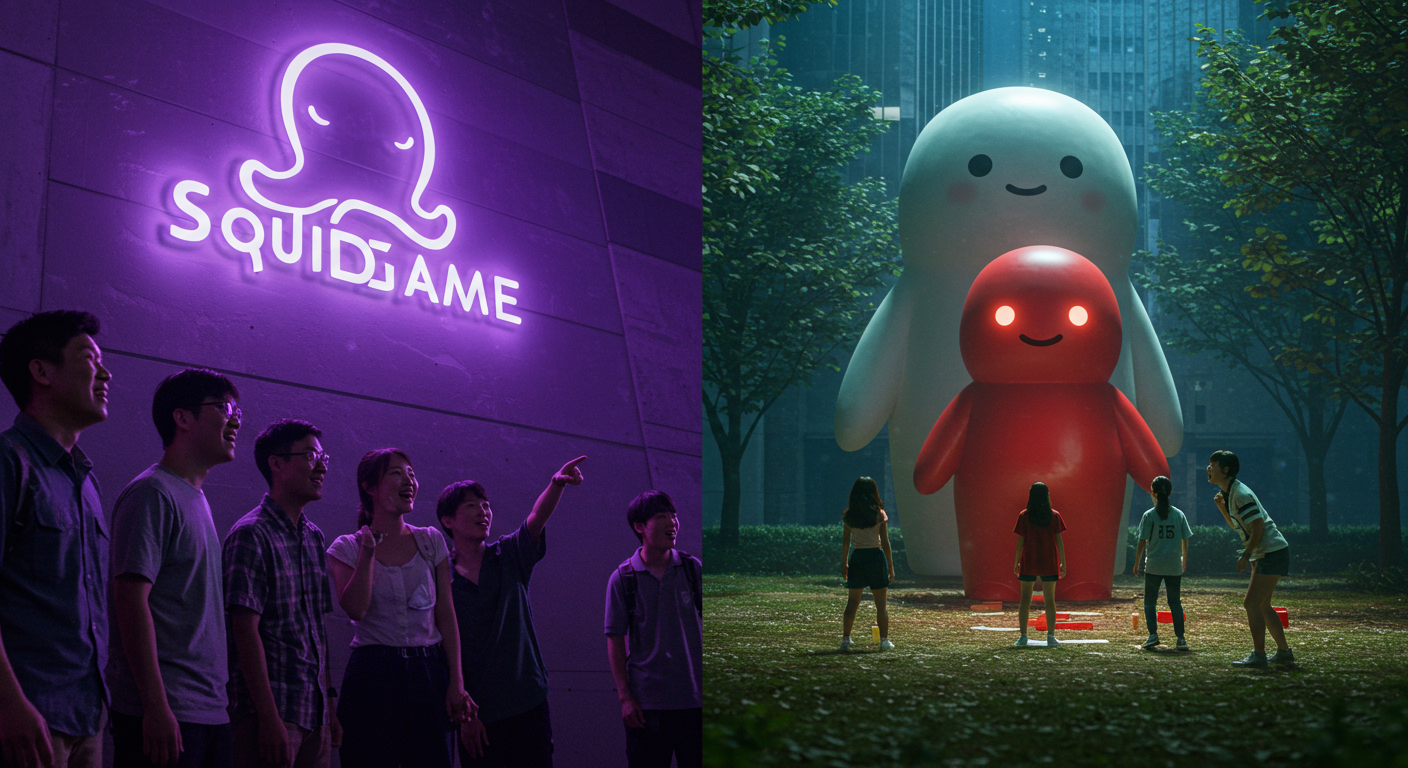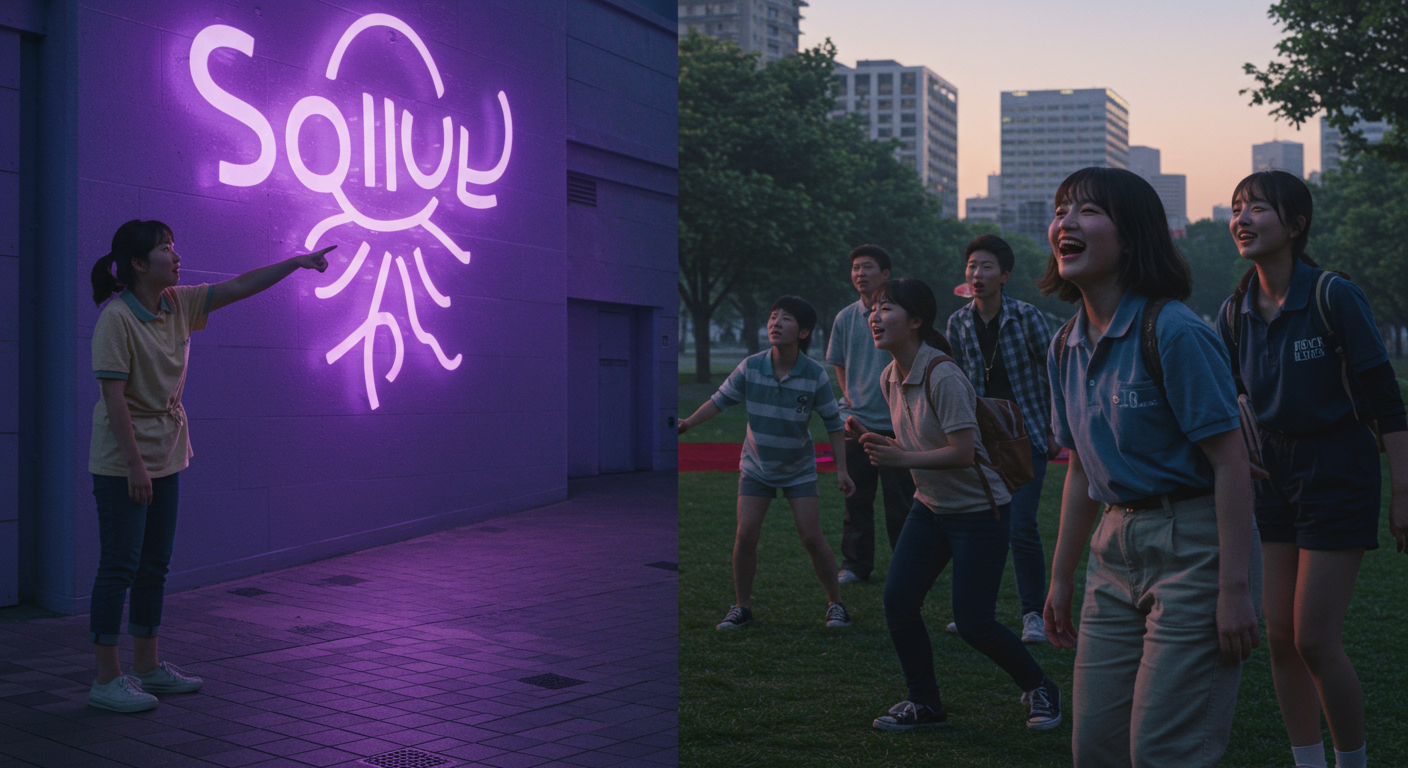Beyond the Games: Understanding Squid Game's Unprecedented Global Impact
Beyond the Games: Understanding Squid Game's Unprecedented Global Impact
Ever wondered how a South Korean show became a worldwide sensation overnight, captivating millions and sparking conversations across every continent?
I remember the buzz around "Squid Game" when it first dropped on Netflix. Honestly, I didn't expect much, you know? Just another show. But boy, was I wrong. This isn't just about a TV series; it's about a cultural tsunami that changed how the world looks at entertainment. It truly left an unforgettable mark, becoming a groundbreaking work in global entertainment. My friends and I were hooked from the very first episode, talking about it constantly, and it seemed like everyone else was too!
 Description: "A diverse group of people from different age groups and backgrounds, looking at a giant, glowing 'Squid Game' logo on a building, symbolizing global reach. The mood is one of awe and curiosity, captured in a vibrant, realistic photograph style with a purple hue."
Description: "A diverse group of people from different age groups and backgrounds, looking at a giant, glowing 'Squid Game' logo on a building, symbolizing global reach. The mood is one of awe and curiosity, captured in a vibrant, realistic photograph style with a purple hue."
Table of Contents
The Rise of K-Content: A New Global Era
To really get what happened with Squid Game, you gotta look at the bigger picture. We've been seeing the Hallyu wave – the Korean Wave – building for years, right? Think K-Pop taking over the charts, K-dramas becoming everyone's guilty pleasure, and movies like Parasite winning big at the Oscars. It wasn't just a sudden burst; it was like, years of careful cultivation, planting seeds all over the world.
I've been following K-content for ages, watching it slowly but surely capture hearts globally. But when Squid Game hit, it felt different. It wasn't just another hit; it felt like the moment Korean entertainment broke through the last barrier. Like, finally, everyone was seeing what I'd been seeing for years. It proved that a story, no matter its origin, can resonate universally if it's told well.
What Made Squid Game Different? Dissecting its Universal Appeal
So, what was it about Squid Game that really stood out? Honestly, it had a kind of brutal simplicity that just grabbed you. Childhood games, but with deadly stakes? That's genius. And it made for a super compelling setup, pulling you right in from the very first scene.
But beyond the shock value, the show hit on some seriously deep, universal themes. Like, debt, class struggle, and how far people will go when they're desperate. Those are things people deal with, or at least think about, all over the world. It showed the raw, sometimes ugly, side of human nature, which, ironically, made it so relatable.
The visuals were stunning too, and the production quality was top-notch. Every shot, every set design, it just looked incredible. And the characters, ah, they were just so… human. You rooted for them, you hated them, you felt their pain. My absolute favorite part, if I'm being honest, was the Red Light, Green Light scene. It was so simple, yet so incredibly chilling. It just stuck with you, didn't it?
 Description: "A still from the 'Red Light, Green Light' game in 'Squid Game', featuring the massive doll and contestants frozen in fear, rendered in a hyper-realistic, dark and intense cinematic style. The atmosphere is tense and terrifying, with muted colors except for the doll's red light."
Description: "A still from the 'Red Light, Green Light' game in 'Squid Game', featuring the massive doll and contestants frozen in fear, rendered in a hyper-realistic, dark and intense cinematic style. The atmosphere is tense and terrifying, with muted colors except for the doll's red light."
Key Factors of its Universal Resonance
Here’s a quick breakdown of what I think really made the show click with audiences worldwide:
| Element | Description | Impact |
|---|---|---|
| Universal Themes | Debt, class struggle, desperation, survival instincts. | Resonated with audiences globally regardless of culture. |
| Nostalgic Games with a Twist | Childhood games turned into life-or-death challenges. | Created immediate intrigue and a disturbing familiarity. |
| Compelling Characters | Flawed, relatable individuals facing impossible choices. | Evoked strong emotional connections and empathy. |
| High Production Value | Vivid, stylized sets and cinematography. | Enhanced immersion and visual appeal, setting a new standard. |
The Power of Social Media and Word-of-Mouth: Fueling the Phenomenon
Let's be real, Squid Game's global success wouldn't have been what it was without social media. It was like an instant, organic marketing machine. Remember all those TikTok challenges? Everyone trying to perfectly cut out the Dalgona candy, failing miserably, and sharing it with the world? Yeah, that was huge.
And the memes! Oh my goodness, the memes were everywhere. From the doll to the specific character reactions, they just took over our feeds. Halloween costumes, too – I saw so many green tracksuits and red guard jumpsuits. It wasn't just watching the show; it was living it, experiencing it, and sharing it. Netflix’s broad distribution certainly played a massive role, getting it in front of so many eyes, but it was us, the viewers, who really turned it into a global phenomenon through pure word-of-mouth and internet chatter.
 Description: "A split image showing a hand attempting to cut a Dalgona candy on one side, and on the other, a group of friends laughing while posing in 'Squid Game' tracksuits during a Halloween party. The style is a dynamic, fun, and slightly chaotic photo collage reflecting internet trends."
Description: "A split image showing a hand attempting to cut a Dalgona candy on one side, and on the other, a group of friends laughing while posing in 'Squid Game' tracksuits during a Halloween party. The style is a dynamic, fun, and slightly chaotic photo collage reflecting internet trends."
Squid Game's Cultural Legacy: Impact Beyond Entertainment
So, what's left after the games are over? Well, a pretty huge cultural legacy, if you ask me. Squid Game definitely turbocharged global interest in Korean culture, language, and, you know, just about everything else from South Korea. I mean, suddenly everyone wanted to try Korean food or learn a few Korean phrases, right?
And it influenced other media big time. You can bet we'll see more survival dramas, maybe even some copycats, trying to capture that same lightning in a bottle. More importantly, it sparked real conversations about economic inequality, debt, and the value of human life in competitive societies. It made people think, which is, like, the coolest thing a show can do. I even saw a local bakery selling Dalgona! It wasn't just on our screens; it spilled out into everyday life.
Lessons for Global Entertainment: Paving the Way Forward
If there's one thing Squid Game taught us, it's that authenticity matters more than ever. Forget trying to make content that appeals to "everyone" by being bland. Focus on a strong, compelling story rooted in its own culture, and if it's good, it'll find its audience. It definitely ripped up the old playbook, didn't it?
The show also highlighted the immense power of streaming platforms like Netflix. They're breaking down geographical barriers and letting unique voices from all corners of the world reach a massive audience. It's not just about big budgets anymore; it's about good storytelling and diverse perspectives. I think this is a huge win for global entertainment. It makes you think about what's truly possible when creators are given the freedom to tell their stories without compromise.
 Description: "A conceptual illustration of diverse filmmakers and artists from various cultures collaborating on a large digital screen, symbolizing global content creation. The background is a futuristic, interconnected network, conveying innovation and collaboration in a bright, optimistic art style."
Description: "A conceptual illustration of diverse filmmakers and artists from various cultures collaborating on a large digital screen, symbolizing global content creation. The background is a futuristic, interconnected network, conveying innovation and collaboration in a bright, optimistic art style."
Q&A: Addressing Your Burning Questions About Squid Game's Success
It tapped into universal themes of economic struggle and human desperation, presented through familiar childhood games with a dark twist. This combination, along with compelling characters and high production quality, resonated deeply with a global audience, making it instantly shareable.
While rooted in Korean culture, its core themes of debt, class disparity, and the dark side of human nature are universal. The show transcended cultural barriers, becoming Netflix's most-watched series globally, proving its broad appeal far beyond South Korea. It's definitely a global phenomenon.
So there you have it. Squid Game was more than just a hit show; it was a cultural moment that shifted perspectives and proved the immense power of authentic storytelling. It reminds us that powerful narratives can come from anywhere and touch anyone, if they hit on those fundamental human experiences. What did Squid Game mean to you? Did it change your view on global entertainment?
© 2024 Your Blog Name. All rights reserved.
Comments
Post a Comment